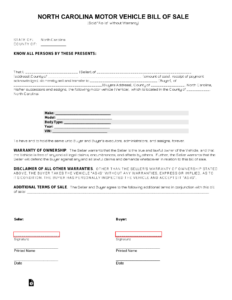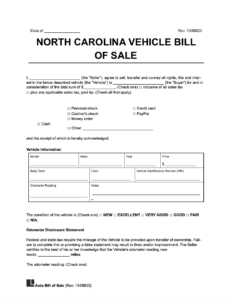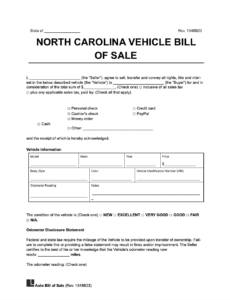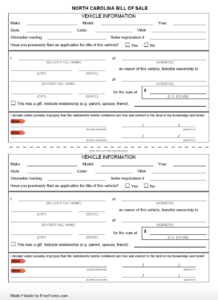Buying or selling a vehicle in North Carolina can be an exciting time, but amidst the thrill of a new ride or the satisfaction of a successful sale, it’s crucial not to overlook the administrative essentials. One of the most important documents you’ll encounter in this process is the vehicle bill of sale. It’s more than just a receipt; it’s a legally binding record that protects both the buyer and the seller, ensuring a smooth transfer of ownership and preventing potential disputes down the road.
Understanding the ins and outs of this document, especially in the context of North Carolina’s specific requirements, is vital. While you might be tempted to scribble something on a napkin, using a proper vehicle bill of sale NC template is the smartest way to guarantee all necessary information is included, making your transaction official, transparent, and hassle-free for everyone involved.
Why a Bill of Sale is Crucial for Your NC Vehicle Transaction
A bill of sale serves as the definitive proof of a vehicle’s transfer of ownership. For the buyer, it acts as a record of purchase, detailing the price, date, and condition of the vehicle at the time of sale. This documentation is indispensable when it comes to registering the vehicle with the North Carolina Division of Motor Vehicles (NCDMV) and obtaining a new title. Without a properly executed bill of sale, you might face significant delays or complications in formalizing your ownership.
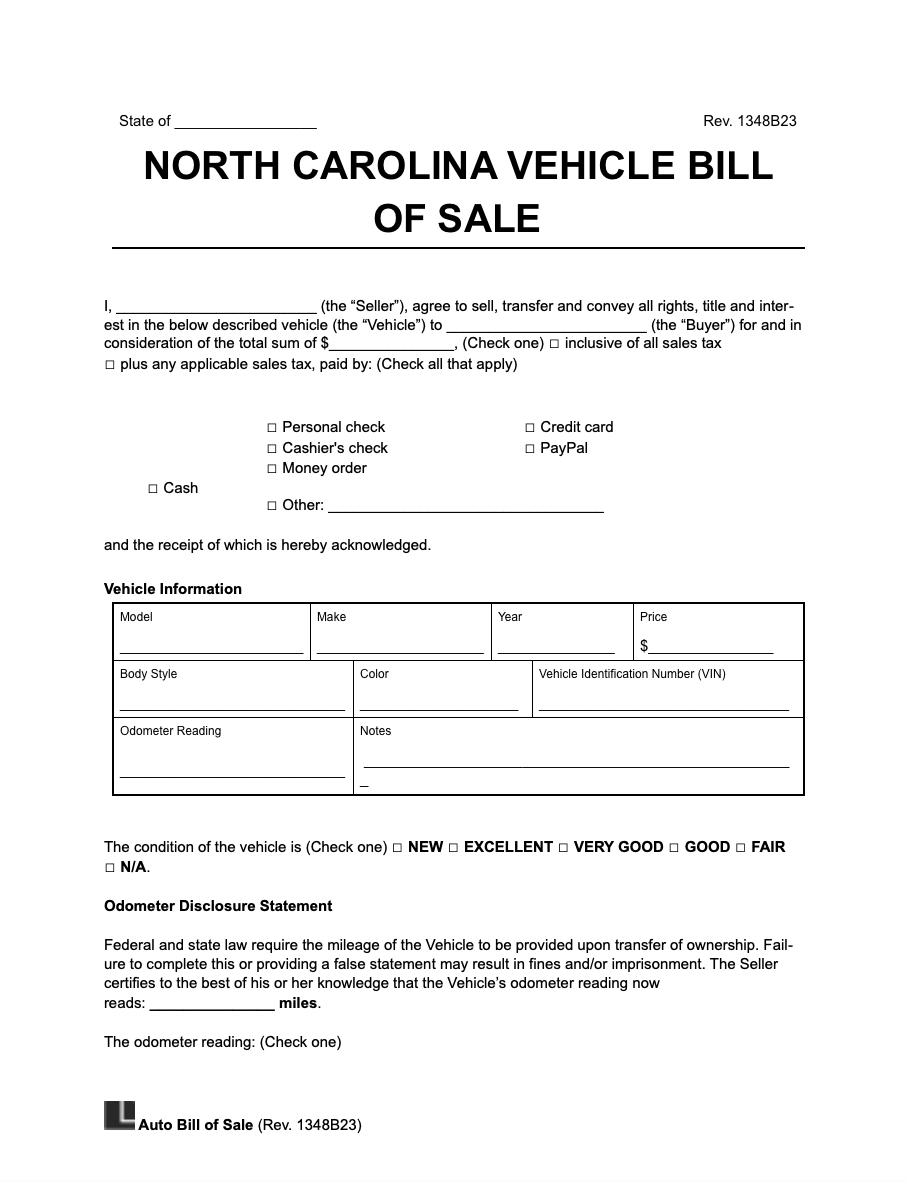
From the seller’s perspective, a bill of sale provides crucial protection against liability once the vehicle is no longer in their possession. It clearly marks the point at which ownership officially transfers, which can be vital if, for instance, the vehicle is involved in an accident or receives a parking ticket after it has been sold. It’s your official record that you are no longer the owner, effectively severing your legal ties to the vehicle.
Beyond legal protection, a well-prepared bill of sale promotes transparency between parties. It ensures that both the buyer and seller agree on the key terms of the transaction, including the final purchase price, any specific conditions of sale, and the vehicle’s details. This clarity helps prevent misunderstandings or disagreements that could arise after the sale is complete, fostering trust and a smoother experience for everyone involved.
While the NCDMV provides an MVR-92 form that can serve as a bill of sale, many people prefer to use a more comprehensive vehicle bill of sale NC template that can be customized to include additional clauses or specific details pertinent to their particular transaction. Such templates ensure that nothing is missed and that both parties have a clear, detailed record of the sale.
Key Details Your NC Vehicle Bill of Sale Must Include
- Full legal names and contact information (addresses, phone numbers) for both the buyer and the seller.
- A detailed description of the vehicle, including its make, model, year, color, and especially the Vehicle Identification Number (VIN).
- The accurate odometer reading at the time of sale, signed and acknowledged by both parties, indicating whether the reading is actual, not actual, or exceeds mechanical limits.
- The final agreed-upon purchase price of the vehicle, clearly stated in both numerical and written form.
- The exact date of the sale.
- Any specific conditions of sale, such as “as-is” clauses if the vehicle is being sold without warranty.
- Signatures of both the buyer and the seller. It’s also advisable, though not always required, to have the document notarized or signed by a witness for added legal weight.
Finding and Using Your Ideal Vehicle Bill of Sale NC Template
In today’s digital age, finding a reliable vehicle bill of sale NC template is easier than ever. Numerous legal websites, automotive resources, and even government agency sites offer free downloadable templates that are specifically tailored to North Carolina’s requirements. Look for templates that are clear, easy to understand, and provide ample space for all the necessary information. Be cautious of generic templates that might not cover state-specific stipulations.
Once you’ve selected a template, carefully fill in all the required fields. Accuracy is paramount here. Double-check every detail, from the spelling of names to the numbers in the VIN and odometer reading. Even a small clerical error could lead to significant headaches down the line when you attempt to register the vehicle or prove ownership. It’s often helpful to have the vehicle’s title and registration documents on hand to ensure consistent and correct information.
After completing the template, both the buyer and seller should review it thoroughly together to ensure mutual agreement on all terms. This is the moment to clarify any lingering questions or make last-minute adjustments. Once both parties are satisfied, it’s time to sign the document. Remember, a signature signifies agreement and makes the document legally binding, so ensure both parties are fully aware of what they are signing.
Finally, and this step is absolutely critical, make at least two copies of the signed bill of sale. Each party—the buyer and the seller—should retain an original copy for their records. The buyer will need their copy for vehicle registration and titling processes, while the seller will need theirs as proof of divestment. Keeping these records secure is just as important as the signing itself, providing a safety net should any questions or disputes arise in the future.
- Always use a template specifically designed for North Carolina to ensure compliance with state laws.
- Verify all information, especially the VIN and odometer reading, against the vehicle’s existing documents.
- Ensure both buyer and seller physically sign the document, and consider notarization for added security.
- Make multiple copies for both parties and keep them in a safe place.
- Understand any “as-is” clauses before signing, especially if you are the buyer.
Taking the time to properly complete a vehicle bill of sale, ideally using a reliable template, is a simple step that yields significant benefits. It provides legal protection for both parties, streamlines the process of transferring ownership, and helps avoid potential legal complications or disagreements that can arise from a casual transaction. This essential document underpins the legality and smooth transition of vehicle ownership, giving both parties peace of mind.
By prioritizing this crucial piece of paperwork, you are not just completing a formality; you are ensuring a secure and transparent transaction for what is often a significant purchase or sale. It’s an investment in your peace of mind and an assurance that your vehicle exchange in North Carolina is handled with the professionalism and clarity it deserves.
